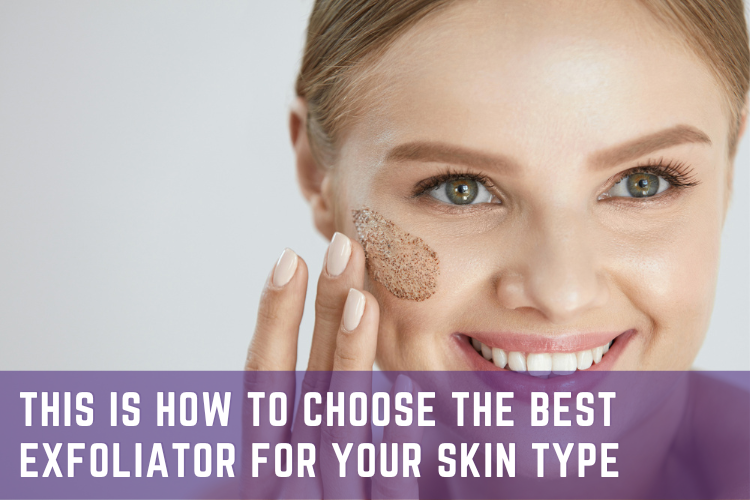This Is How to Choose the Best Exfoliator for Your Skin Type
Different types of skin need different types of products. Learn how to choose the best exfoliator for your skin type here.

Women spend an average of almost $4,000 on skincare per year on a variety of products like cleansers, moisturizers, anti-aging, and more.
One of the most popular skincare products is an exfoliant, and many women include it in their skincare routine. But what is an exfoliant and why should you consider using one? What's the best exfoliator for your skin type?
If you're curious about exfoliation for your skin, keep reading to learn why you should consider using an exfoliator.
What Is Exfoliator?
Skin cells regenerate regularly, leaving dead skin cells on the surface of your skin. Not only do dead skin cells leave skin looking dull, but your skincare products cannot properly penetrate your skin. Exfoliation removes those dead skin cells.
The benefits of exfoliation include achieving a glowing complexion and helping your products work better. If you suffer from breakouts, ingredients from the exfoliator settle into your pores helping to clear your breakouts. You'll also benefit from a smoother skin tone.
Exfoliation Methods and Frequency
There are two different methods of exfoliation.
The first is physical scrubbing. These types of exfoliating products contain small amounts of an exfoliant like scrubbing beads or fine powders that slough away dead skin. You scrub gently and then wash it away.
Peels are also exfoliants. You apply the peel to the skin and leave it on for the recommended amount of time. Then, you peel it off to reveal renewed skin.
Depending on your skin type, you'll want to exfoliate 1 to 3 times per week, more if you have oily skin. But following the directions on the product is the best course of action.
What Is My Skin Type?
Exfoliation works best when you paired it with your skin type. Not all exfoliants are created equal, so knowing your skin type is key. Genetics is largely responsible for your skin type, but it changes over time due to factors like the environment and age.
Here are the five basic skin types and a description of each.
Normal Skin
Normal skin has a perfect balance of oil and dryness. The texture is usually smooth and isn't sensitive to most skincare products.
Sensitive Skin
Sensitive skin becomes aggravated easily by skincare products or external factors. You may suffer from redness, irritation, flakiness, or general discomfort.
Dry Skin
Dry skin feels tight and dry after washing or even during the day. People with dry skin need to give their skin extra care because it cracks easily leaving the skin prone to bacteria and infections.
Oily Skin
Oily skin produces an abundance of oil that leaves the skin feeling shiny and slick. People with oily skin may have acne which typically occurs in younger people.
Combination Skin
Combination skin is a mixture of different skin types. You may be oily in some places, like the T-zone, and dry or sensitive in others. Although you can have a combination of any skin type, dry and oily are the most common.
If you're unsure about your skin type, a dermatologist can walk you through the possibilities and offer insight.
Best Exfoliator for Your Skin Type
The best exfoliator is the one that matches your skin type. This way, you'll get the best results and avoid potential irritation. Here are some suggestions on what to look for in an exfoliant according to your skin type.
Dry Skin
Perhaps you think the best exfoliator for dry skin is no exfoliation, but dry skin still needs exfoliation. Look for a creamy exfoliation product, that provides moisture, and contains glycolic acid. Glycolic acid hydrates your skin.
Oily Skin
The best exfoliator for oily skin would be a physical scrub. If you're prone to acne, you'll want to get an exfoliator that has an acne-fighting ingredient like salicylic acid.
Combination Skin
Combination skin could benefit from several ingredients. With combination skin, you could choose from a physical scrub or a peel, but this depends on how oily or dry you are. Be careful with areas that might be sensitive to you.
Normal Skin
Normal skin types, rejoice! For normal skin, there shouldn't be any restrictions on the type of exfoliation you choose. However, be aware that normal skin exfoliates well on its own, so there's no need to exfoliate often.
Sensitive Skin
Sensitive skin types should be aware of the ingredients and methods they use, as sensitive skin has several negative reactions to products. Stick with peels that are formulated for sensitive skin, as physical scrubs aggravate skin more.
If you have mature skin, you might want to choose an exfoliant that targets fine lines and wrinkles.
How to Exfoliate Well
Start by washing your face with a cleanser for your skin type. Once you've dried your face, apply the exfoliant according to the directions. If you're scrubbing, don't over scrub it because this will produce more oil or irritation.
Once your scrub or peel is complete, rinse your skin, and apply a toner. Toners bring your skin to an acceptable pH level and remove any residue the exfoliant left behind.
After using your toner, apply your serums and moisturizers. You can feel confident that they'll work better after your exfoliation.
The Best Exfoliator for You
Looking for the best exfoliator comes down to diagnosing your skin type. When you realize your skin type, you can choose products that work in your skin's favor. Get glowing healthy skin with exfoliation!
Are you looking for the best exfoliation products for your skin? Our products offer ingredients that help you achieve your best skin. View our line of exfoliants today!



